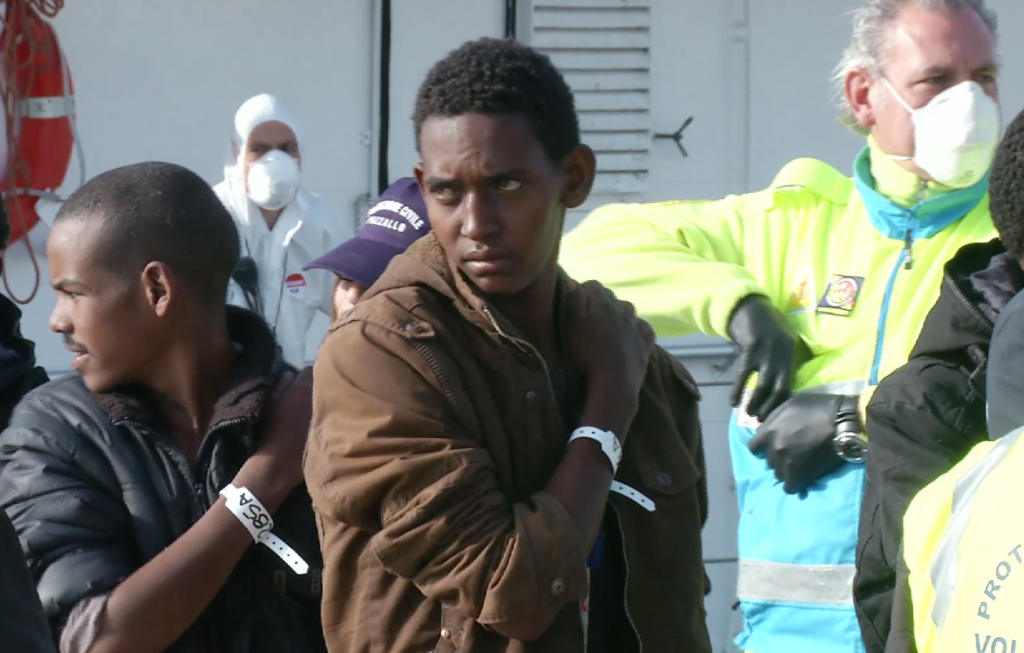
“It’s an Exodus” sighed Sargeant Marco DiMilla who works in the press office for the Italian Coast Guard when I called him frantically Wednesday morning trying to figure out which ports the Coast Guard ships would be landing at in Sicily and disembarking migrants rescued at sea. He reeled off some numbers and places as I rapidly took note, four hundred in the Sicilian port of Trapani, 500 arriving in the port of Augusta, another 300 in the port of Pozzallo, and hundreds disembarking at that moment in the port of Palermo.
Over 10,000 migrants have been rescued at sea by the Italian coast guard, navy and merchant ships this past week. In Sicily, migrant holding centers are overflowing with thousands of migrants and the Italian government is flying and bussing them to centers across Italy stirring a national debate as Italy’s northern regions resist cooperating.
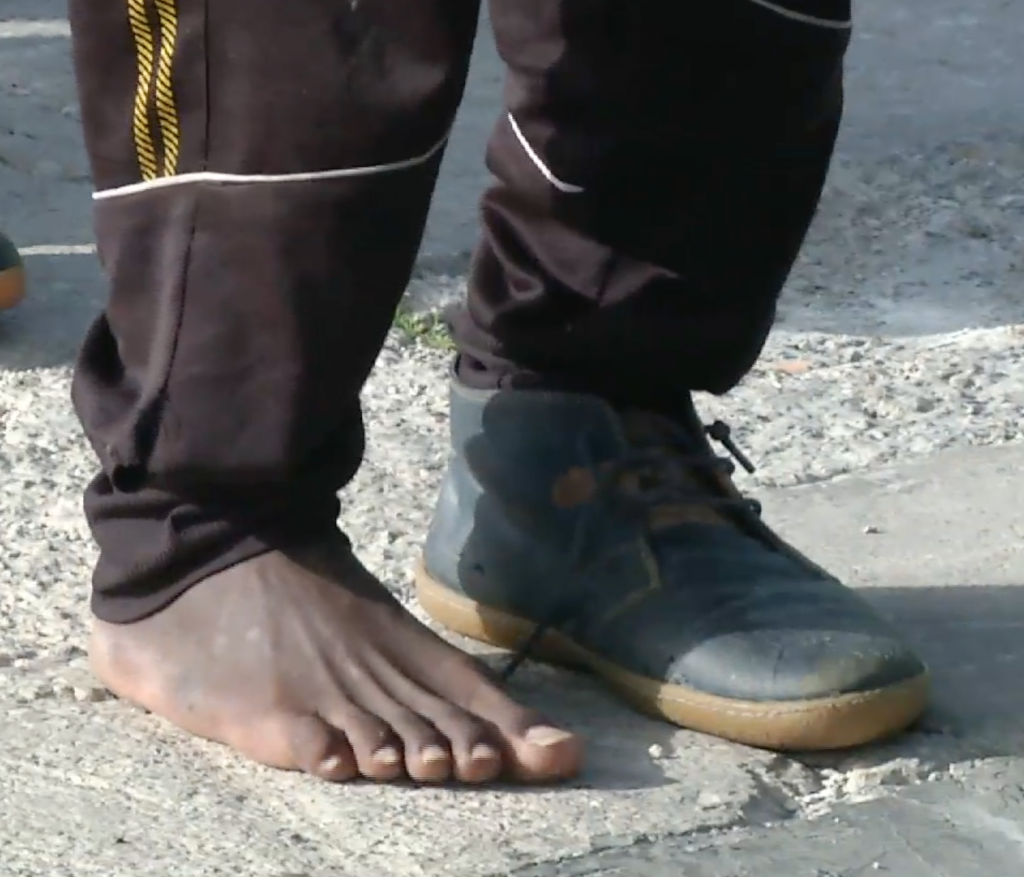
I’ve written a lot about the migrants on this blog, in my most recent post on this topic (see blog post: The Dinghy Debate) I explained that 170,100 migrants arrived on the Italian coasts in 2014, so far in 2015 the number is over 21,000 according to Flavio Di Giacomo, a spokesman for the International Organization for Migration (IOM) who spoke to us today.
The figures on the dead at sea are a rough calculation based on survivors estimates of how many people were on their ship and how many died when it capsized. Di Giacomo of the IOM told us today that they believe there are at least 900 who died trying to make the crossing so far this year.
The figures get fuzzy but the facts are simple. Libya has descended into chaos. The traffickers in Libya have free hand to run the show, filling up rubber dinghies and rickety wooden boats until they are crammed with the poor, hungry and desperate, shoving them off to sea with not enough petrol to get very far and phones to call the Italians for help. Now that the weather is getting warmer and the sea calmer, the boats attempting the crossing have increased dramatically.
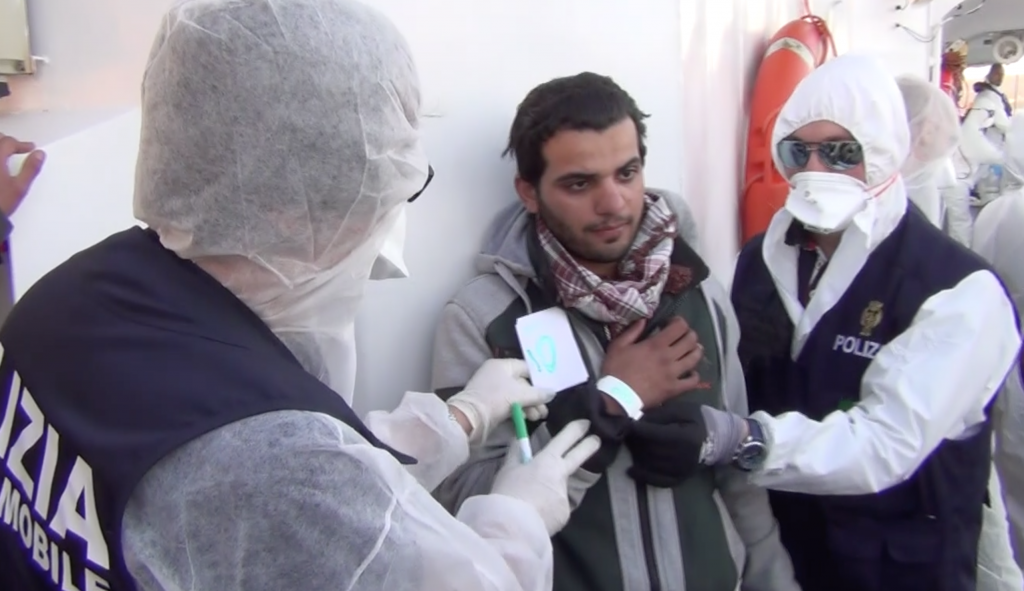
This week the police in Ragusa, near the Sicilian port of Pozzallo, were busy arresting human traffickers. So far they have arrested 16 suspected traffickers this year. They explained to us that the traffickers charge 600 euros for a spot in a rubber dinghy – mostly taken by poorer Sub-Saharan Africans from Nigeria, Mali, Gambia, Senegal, Eritrea and Somalia. The cost for a place on wooden boat is higher, and mostly goes to migrants who can pay more, in particular the Syrians. Those prices can run from 1500 dollars to 4000 dollars, according to the Italian police.
As the traffickers raise the prices, they become increasingly violent. Flavio Di Giacomo of the IOM described for us today the scene on the Libyan shores as survivors have described it to them. “When they arrive on the beach (on the Libyan coast), when they are ready to leave, some people are scared, they change their mind, but there is an unwritten rule that some migrants told us about, it is once you pay, you can not go back. Even if some migrants see that the weather conditions are bad, the vessels are really unsafe, unworthy, and they change their mind, they can not do that. So they are forced to get on board with sticks, and with guns.”
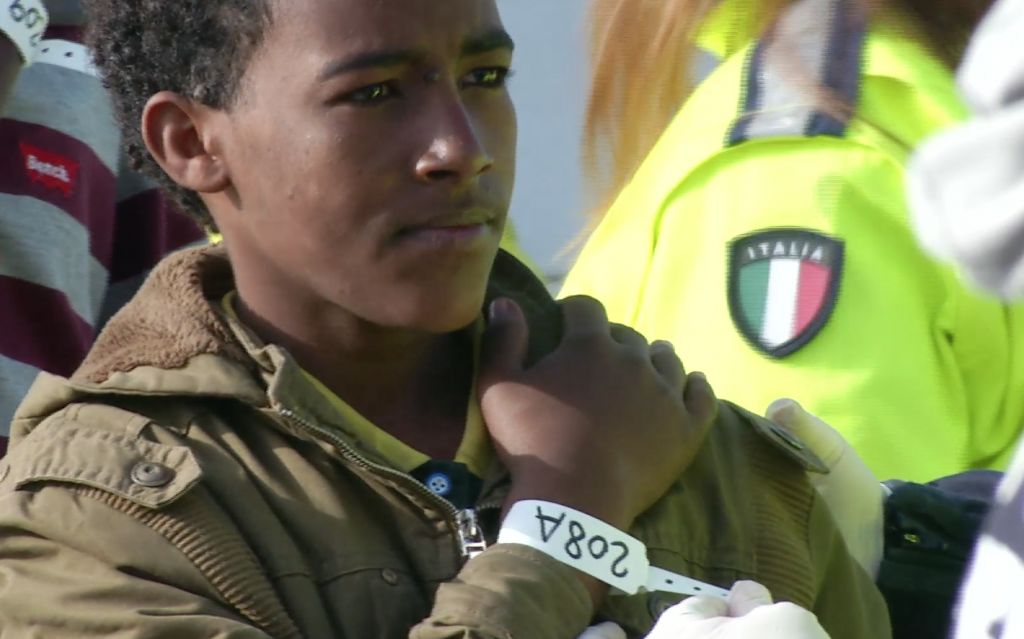
On Thursday we also had the unexpected arrest of 15 migrants following reports of a fight breaking out between Christians and Muslims on a migrant boat. Survivors said the Muslims threw the Christians overboard. A police statement said those arrested were accused of multiple homicide aggravated by religious hatred. This news made headlines around the globe. An investigation is underway, however, an interview by one survivor today on Italian State Television threw some doubt on the story as a Christian survivor speaking in minimal English described it as a fight between Christians and Muslims with most of them ending up in the water.
So what happens to all these migrants once they arrive. The ones who have relatives in other parts of Europe try to head north to France, Sweden, Germany as soon as possible, the poorer migrants remain.
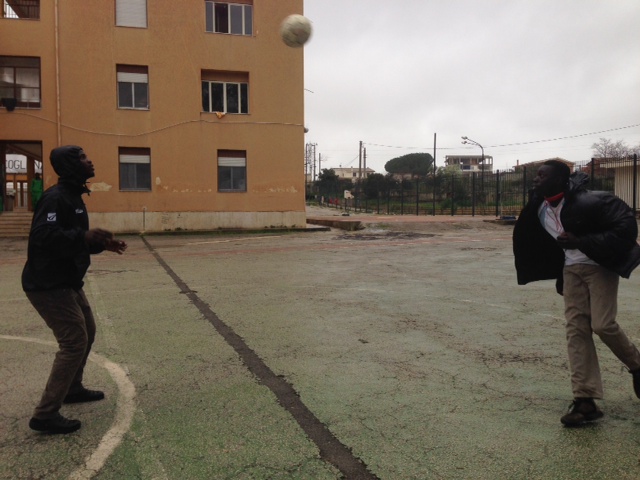
I was in Sicily a few weeks ago where I visited the migrant center “Umberto I” near Siracusa. There I found 195 African men who were trapped in limbo with nowhere to go, no money to get there, no legal documents and sinking hopes as they waited, perhaps in vain, for political asylum. They had all arrived by boat, making the treacherous journey across the Mediterranean in the past few weeks and were just standing around waiting to see what would happen to them.
According to a report on asylum seekers released in March by the United Nations High Commission for Refugees there was a stunning increase in the request for political asylum in Italy in 2014. The report shows 63,700 people requested asylum in Italy making it the highest year on record and a jump of 148 percent from 2013.
While Syrians and Eritreans have been the national groups with the most people arriving on Italy’s shores, they tend not to request asylum in Italy. The top number of asylum seekers come from Mali (9,800 requests in 2014), followed by Nigeria and Gambia.
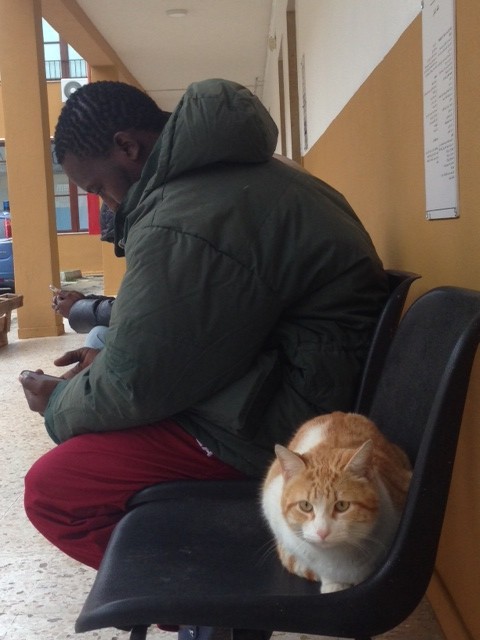
The men from Mali, Nigeria and Gambia at the “Umberto I” center were wearing an odd assortment of clothing clearly provided by charity groups. Many were in bright green and red sweat suits, one man was in a professorial tweed jacket and another appeared to be wearing a girl’s coat with fake fur collar.
The center provided them with phone cards worth 2 euros and 50 cents every day so they could communicate with their families back home, or they could opt for a packet with 10 cigarettes. Most of them appeared to have cell phones and seemed to fill the long hours glued to them playing games and listening to music.
Some of the younger men kicked around a soccer ball on a concrete court with some nets at the back of the center.
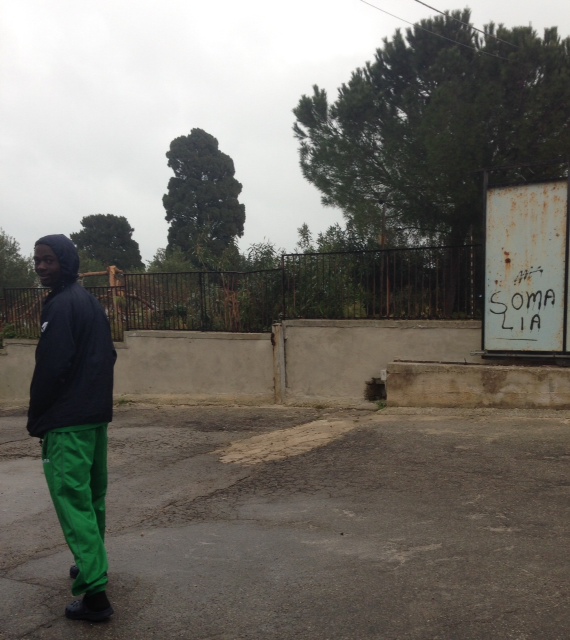
The men were free to leave the center and walk around the town as they pleased, but if they fled before they had appeared before a commission to request political asylum, they would lose their chance to get it.
Their stories were all similar; escape from their own countries – Senegal, Mali, Gambia, Ivory Coast – harrowing trips through the desert with people falling off the back of 4-wheel drive trucks and left to die, little water and food. When they reached Libya many were persecuted, thrown in prison, and harassed by bandits. Eventually they made it onto a rubber dinghy headed across the Mediterranean.
Koffi Kouodio Hermann of the Ivory Coast said he was escaping war and killing in his own country and now wants to try to find a way to bring his wife and children to Europe. He said he studied natural science, history and geography at University and hopes he can find something to do in Europe.
Lamin Beyai from Gambia wore red headphones on his head and slipped them up on to his forehead as he chatted with me. He said he is waiting to see if he can get political asylum, but he cannot go anywhere because he has no documents. He described his recent trip across the Mediterranean, “It is not easy being in the sea where anything can happen. Only God can save you there.”
As he told his story, Landing Sono, a 25-year-old from Senegal, threw his hands over his face saying, “if I think about it I want to cry because I have no money, not even these clothes are mine. I was a man…in the name of God.”
The Italians are desperately calling on the rest of Europe to do its part to help with this crisis. There pleas are being met with tepid enthusiasm by the rest of Europe. I have been struck however, by the determination of the Italians to continue. My colleague Andrea Rosa interviewed a Coast Guard Lieutenant this morning who is Captain of the Fiorillo ship. The ship had just brought 301 migrants into port. Captain Giuseppe Di Maggio told Andrea, “I think all of us wish that a mediation and a solution can be achieved at a European and international level to this emergency, which is affecting our country now more than ever. As for us, we have a moral, ethical and professional duty to save people at sea, no matter what the international agreements are.”
As I went through the video and photos to decide which ones to put in this post, a few lines came to my mind — “give me your tired, your poor, your huddled masses.” Those are the words of poet Emma Lazarus whose lines appear on a plaque on the Statue of Liberty.
“Give me your tired, your poor
Your huddled masses yearning to breathe free,
The wretched refuse of your teeming shore.
Send these, the homeless, tempest-tossed to me:
I lift my lamp beside the golden door.”
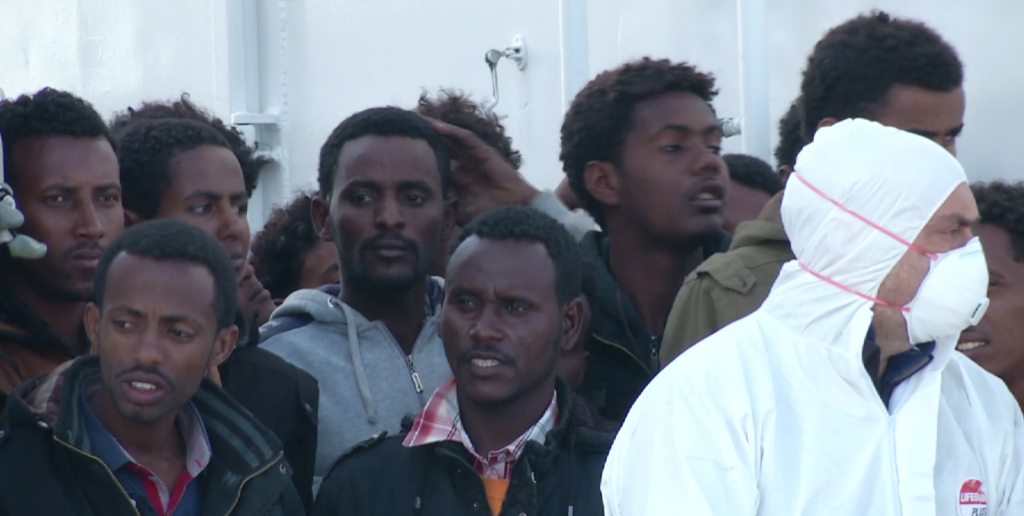
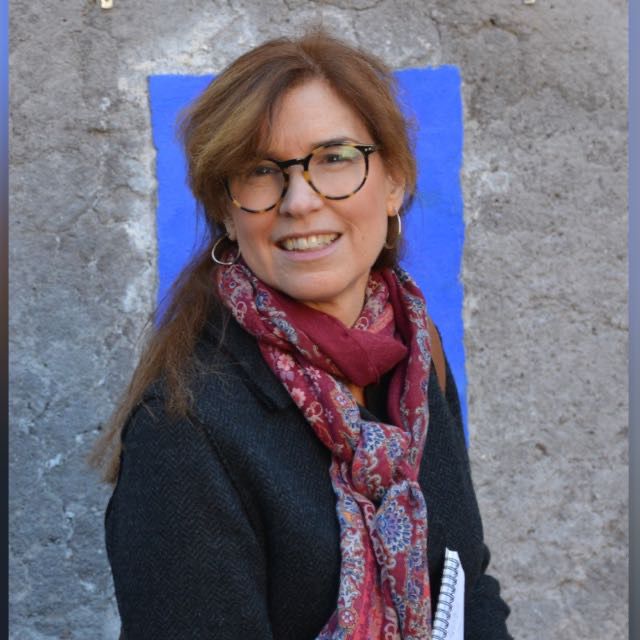
Brilliant story, Trisha. The insight you bring to this issue is remarkable. This is such a complex problem and it is not just an ‘Italian problem’ either. The problem rests on not only the EU, but I believe the UN. The Italian government and the Italian people, who are already facing incredible challenges with their own economic issues, should not and cannot be held responsible for the insurmountable burden of so many immigrants when they cannot adequately employ and support their own citizens. Let’s face it, the Italian economy cannot bear the added burden and the Italian people, as generous and kind as their natures may be, have a limit, too. I mean, 200,000 people since the beginning of last year? That’s a lot!!
I am a bit flummoxed by the Lampedusa situation which I think you may provide some clarity. How long does it take for them to be granted asylum? If they don’t get asylum, do they just stay there on Lampedusa forever? Have any other EU countries offered to take in any of these political refugees? It seems to me that Angela Merkel should step up to the plate here.
Kay — You are so right. The Italian economy cannot handle this huge influx. The unemployment level is already high enough. Many of the migrants move quickly out of Italy though and head north. Other countries in Europe – Germany and Sweden in particular– get a lot of requests for aslyum. I perhaps was not that clear about the political asylum in Italy. First on Lampedusa, the migrants just stay a few days and then are moved out to make space for others. In other centers in Sicily and in other parts of Italy they are free to leave, but if they are requesting political asylum they need to stay until they have their first meeting with the aslyum commission and have a document showing their case is under consideration. Most of the African migrants are stuck in that situation. The Syrians and some Eritreans, on the other hand, tend to get on trains and leave immediately trying to reach relatives in other parts of Europe. Once the migrants get a piece of paper from the asylum commission, then they head out to find work — many Africans for example work for a pittance in the lemon and orange groves in southern Italy, or cultivating tomatoes — paid in black obviously. Others sell fake designer purses on the streets of Italian cities. If they don’t get asylum, I don’t think many of them are sent back to their countries. They slip away first. You raise a lot of interesting questions though and I need to do more reporting on this.
I’m Italian and live in Italy. I’m kind of used to be looked down on as non efficient, chaotic, sort of lazy by some fellow European. This situation reveals more than one truth: Italians are chaotic and not really efficient, but they act, keeping in mind people. Fellow European often are efficient because they just avoid most thorny matters, they pretend bad situations don’t exist.
Europe as a gathering of citizens, of persons who have common ethic and alike feelings, in the very end doesn’t exist. Wealthy European countries consider EU from an economical point of view, only.
That’s another truth.
Italy’s coasts are Europe boundaries: letting Italy alone to cope with this Exodus shows the small-mindedness of the Europe project which had far different aims (see Altiero Spimelli’s dream).
Captain Giuseppe Di Maggio’s words tell what Italians are: non efficient, cahotic. Goodhearted, unselfish and open to help who is in need, too. And these are the things which are needed to build a community. Not only money.
Thank you Trisha for your interest in migrants!
Thank you so much for this comment. It is so nice to hear an Italian point of view. And I agree with you totally. Italians are viewed as inefficient and chaotic, messy, irresponsibile, and corrupt — but look what the Italians are doing for these migrants. It is incredible. I have seen the Italian Coast Guard at sea — they are efficient, capable, talented, courageous and heroic. If I were Italian, I would be very proud. Italy is giving an example to the world– while the rest of Europe seems to be standing around twiddling their thumbs.
Italians can be a lot of things, also capable, efficient, talented and courageous. Our faults can twist sometimes into merits: our looseness often becomes flexibility! In the migrants matter, this is very useful, for instance… I am proud of being Italian.
Can the rest of Europe say the same? Can I be proud of being European, too?
Often savaged for how bad we are, seldom praised and supported for how good we are…
Well, I praise you are Italians for how good your are. You are right to be proud to be Italian in this moment. The Italians are showing true courage in this crisis.
Oh my gosh my heart just cracks in two. Migrant 208A looks the same age as my son. I pray they find a new home and some peace.
Perhaps that is why the image struck me– that boy is probably about the age of my son too (20). Can you imagine our sons making that journey who knows what horrors that boy has seen.
The ending of your piece made me want to cry. So many of us enjoy the lives we have because those words were true for our grandparents. Today, America has largely closed its doors to the huddled masses yearning to breathe free. The burden or torch has been passed onto Italy and also to Greece.
Both countries have enormous economic challenges of their own, and still, the desperate and hungry continue to flow onto their shores. I think Europe as an entity needs to recogonise that this is not only a Greek or Italian problem, IT IS ALL OUR PROBLEM.
More needs to be done to assist those who do make it here, but at the same time something needs to be done about the human parasites living off of human misery.
I agree Martha — we all need to do something to help this situation. As you say those “human parasites” need to be stopped. I think the Italian police are finally making some headway on arresting and prosecuting the traffickers, but it is slow going. I think the Italians have shown so much generosity partly because they know their own ancestors were part of those “huddled masses” headed for the US in search of a better future. And as an American, from a country of migrants, I think we might show a little more hospitality and generosity to the desperate migrants trying to get to the US. I also think governments need to think about ways to help these people at the country of origin. More investment in some African countries might give opportunities to some of these migrants at home so they would not risk making the perilous journey.
Trisha – So much credit is do to you for social/humanitarian journalism. A so much credit to the Italians for their generous response to this humanitarian crisis, Your own sense of injustice comes through your reporting so clearly. You are the only source I know that provides such comprehensive reporting. I also appreciate you commitment to following this story not just capturing a headline and moving on to the next but returning to this story over and over and reminding us it is an on going tragedy.and one for which we all need to be aware of and acting on if the opportunity arises. Maybe we should ask the newly liberated nuns to help alleviate the crisis.
L/D
Thank you Dad, you are always my biggest fan. I wondered all week if I should do another post on this story. I am so fascinated by it and wrapped up in all the details, but I do worry sometimes that I might bore all my blog readers. And on the liberated nuns…I let that story slide amidst all the migrant stuff this week, however, what a relief to have that all over with.
What a sad situation. It is good to hear that these migrants are getting assistance, but I can certainly understand that the sheer numbers make it impossible for Italy to go it alone with this. I wish that all of Europe could somehow come together to help these people. Does the United Nations provide much assistance either in manpower or funding?
I am struck by the photos of the migrants as they interact with the workers who are covered in protective gear. While I understand the need for the “suiting up”, it just seems to underline the “otherness” , the strangeness, the almost “untouchable” status of the migrants.
Thanks for keeping on this. It has actually begun to be in our news here in the U.S. with some regularity. It is good that the plight of these people is introduced into the American consciousness. Here, as in Italy, the feelings and sympathy, or lack thereof, run the gamut.
I totally agree with you about the sanitary suits and masks. There was a period when everyone was terrified that all these migrants would be bringing Ebola over to Italy, even though doctors and experts repeatedly said anyone with even the earliest stages of Ebola would not make it. But that is when they really started putting on cover-up suits and masks. Also, I’ve seen video of health workers checking their hair (for lice) and their teeth (what would that be about?). The images are jarring and does give the impression of the “untouchable”. However, that said, once they are in the holding centers, there are no more of those suits and I find the Italians are very humane.
Really appreciated reading this report Trisha. Heartbreaking. Let’s hope that the situation somehow improves. So glad to hear of people like Captain Di Maggio. I will post this on my Facebook page as some of my US friends have asked about the situation. Nothing better than a first hand account. Thanks.
Thank you Jane for your comment. It is heartbreaking. And thank you for posting it on your facebook page. It is always satisfying to reach a larger audience.
What a sad story. Thank God for Italy and Italians willing to help. And thank you for writing about this sadness most of your readers know little about. Thank you also for quoting the poem. I wish more of the legislators in my country would read it and pay attention to the plight of our own immigrants too instead of fighting the executive orders meant to help the problem here.
A presto
Thank you Joan. I love that Emma Lazarus poem and it so perfectly describes the migrants coming to Italy right now, it is hard to imagine our ancestors looked that way.
Where are the women and children? Left behind to face atrocities?
Actually there are a lot of women and children. Lots of pregnant women and newborn babies. I couldn’t find any good images of women to put in this post, but there are plenty. And sadly the women often have it worse than the men, being forced to prostitute themselves for money while they wait in holding centers. I’ve been told the authorities have a terrible time trying to get the women to speak and accuse the men who are abusing them which leaves the police and prosecutors with little to work with. It is horrible and definitely on the top of my list of stories I want to do. I have been asking for about 6 months now, and it is nearly impossible to find one of the migrant women to tell her personal story on camera. I will not give up on this though.
Bravo Trisha. This is critical information that we all need to hear. Keep these stories coming. And please keep trying to get information on women. As painful as it will be for all of us to read, it is a critical piece.
It just never ends. Here is the latest this afternoon.
ROME (AP) – A boat believed to be crowded with 700 migrants capsized in the waters north of Libya overnight, leaving at least 24 confirmed dead and sparking fears for what could become the Mediterranean’s deadliest known migrant sea disaster, Italy’s Coast Guard and other officials said Sunday.
***
I will definitely keep looking into the angle on the women.
. . the sheer scale of the human-induced misery is beyond comprehension. The compassion of the countless Italians doing whatever they can to alleviate that misery beyond compare.
The UK, one of the core FUKUS/NATO/GCC terrorist entities proudly announced that it had granted asylum to 143 Syrian refugees fleeing their country which is being systematically destroyed by said terrorist entity. Compare that with 30,000 granted asylum by Germany and 1.1 million (26% of the total population) given asylum in Lebanon! The same demonic, hegemonic policies are/have tearing much of the Middle East apart along with Somalia, Yemen and much of Africa. The Rogue States of FUKUS/NATO/GCC lie at the centre of the majority of the world’s misery.
Wow, what an incredible statistic– that makes the UK look pretty bad and Lebanon look very good. Also, Jordan is another Middle Eastern country that has been incredibly generous about taking in migrants.
Oh Trisha. My heart just aches for these people. I can’t help thinking that just by an accidental stroke of luck, we were born here and not in one of their countries where famine is rampant and freedom is sparse. I have read some of your other posts on the subject and you are to be commended for following up and shedding more insight on this continuing issue. It won’t go away as long as there are repressive governments and hunger in places around the world. Europe should be taking a broader view, and the U.S. too. Although it’s being written about more frequently in the newspapers, most Americans don’t have any idea of the hardships inflicted on these innocent people.
I totally agree Linda. I feel so lucky to have been born where I was and have the life I have. These stories make one realize that our little daily complaints are so small compared the the scale of misery so many of these people face.
Oh how my heart aches for those whose stories you tell us — and I weep at the news this morning, of another packed ship that capsized in the night, with full rescue attempts by the Italians still unable to save very many. The callous indifference of the world is contemptible, and the heroism and compassion of the Italians is so moving. I do wish America owned those words on the Statue of Liberty, but as you doubtless know, the mood in America now is very anti-immigrant. Most of the fears are false ones, and none of the good immigrants do every day seems to make any difference. There is an ugliness in the souls of northern hemisphere whites that is growing. And its seeds are, I think, in the 1930s, and the rise of fascism then, in its doctrine of racial purity and cultural superiority. Italy shines like a star, and Pope Francis is a fine voice. May he speak loudly now. And may you continue to write about all this, so that we may listen –
Thanks for your interesting and very thoughtful comment Nancy. Scary to think about the 1930s and the rise of fascism. I won’t respond properly now because I am down in Catania, Sicily covering the aftermath of that disastrous shipwreck — looks like 800 dead, and the women and children were locked below. Just horrifying.